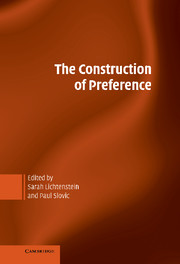Book contents
- Frontmatter
- Contents
- Contributors
- Preface
- Acknowledgments
- I INTRODUCTION
- II PREFERENCE REVERSALS
- III PSYCHOLOGICAL THEORIES OF PREFERENCE REVERSALS
- IV EVIDENCE FOR PREFERENCE CONSTRUCTION
- V THEORIES OF PREFERENCE CONSTRUCTION
- VI AFFECT AND REASON
- VII MISWANTING
- VIII CONTINGENT VALUATION
- IX PREFERENCE MANAGEMENT
- 34 Measuring Constructed Preferences: Towards a Building Code
- 35 Constructing Preferences From Labile Values
- 36 Informed Consent and the Construction of Values
- 37 Do Defaults Save Lives?
- 38 Libertarian Paternalism Is Not an Oxymoron
- References
- Index
36 - Informed Consent and the Construction of Values
Published online by Cambridge University Press: 05 June 2012
- Frontmatter
- Contents
- Contributors
- Preface
- Acknowledgments
- I INTRODUCTION
- II PREFERENCE REVERSALS
- III PSYCHOLOGICAL THEORIES OF PREFERENCE REVERSALS
- IV EVIDENCE FOR PREFERENCE CONSTRUCTION
- V THEORIES OF PREFERENCE CONSTRUCTION
- VI AFFECT AND REASON
- VII MISWANTING
- VIII CONTINGENT VALUATION
- IX PREFERENCE MANAGEMENT
- 34 Measuring Constructed Preferences: Towards a Building Code
- 35 Constructing Preferences From Labile Values
- 36 Informed Consent and the Construction of Values
- 37 Do Defaults Save Lives?
- 38 Libertarian Paternalism Is Not an Oxymoron
- References
- Index
Summary
Informed consent is a fundamental component of moral justification. It distinguishes love-making from rape, employment from servitude, and life-saving surgery from felonious assault with a deadly weapon, to mention just a few examples. At a more general level, consent distinguishes democratic from authoritarian governments, and it justifies a capitalist economic system. Efficiency is important, but freedom is what makes capitalism most appealing, as producers choose what to produce, and consumers choose what to buy. Consent is required to justify activities that impose a risk of harm or death on others. This is true of dramatic and newsworthy instances, such as trying to site a nuclear waste disposal facility, but it may also be true of activities as mundane as driving cars. When I drive a car in a city, I impose a risk of injury or death on innocent pedestrians. I also contribute to pollution and climate change, which imposes further risks on others. I do not know how the consent process works that permits me to engage in this kind of risk-imposing activity, but it seems reasonable to think that some sort of tacit consent must be at work to justify our using automobiles.
When disparities of power or the effects of new technologies threaten the effectiveness of consent, democratic governments intervene with regulations aimed at reinforcing the conditions of consent or establishing procedures for obtaining it.
- Type
- Chapter
- Information
- The Construction of Preference , pp. 668 - 681Publisher: Cambridge University PressPrint publication year: 2006
- 1
- Cited by



